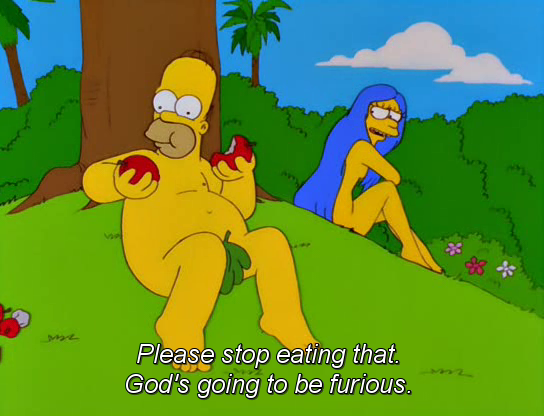- What are the major differences or similarities between the ethos of the creation story or stories you are familiar with and the story King tells in The Truth About Stories ?
Creation stories are tremendous things. They’re stories that tell us something vital about religion, about culture, about beginnings. They indicate the very start of life, the universe, god(s), and tradition. In this way, they’re pretty spectacular. They’re huge. They try to cover a lot of ground while still keeping us interested. And somehow, these incredible stories are perceived as truth.
I grew up in the Catholic School system. We had school mass every week, school-wide confession, morning and lunch time prayer read over the PA, and an entire course called Christian Education to teach us all about the nuances of Roman Catholicism. I spent many hours in class learning about creation stories, about the book of Genesis, how God created the earth in 7 days, the Garden of Eden, and the ways we’re being punished because two people were fooled by an (actually very charming) snake. For many years of my life, these stories were my truth. Until one day, they weren’t.
King says, “the truth about stories is that that’s all we are.” In this way, we’re quite dynamic. Stories change as they are told and retold. King explains the modified versions of the story of the earth on the back of a turtle, saying, “I’ve heard this story many times, and each time someone tells the story, it changes.” The same goes for the stories we write for ourselves. So, as for me and the creation stories I learned: I believed, and then I didn’t. Now, these particular creation stories are just stories to me.
For some, entire belief systems are built upon the retelling of a narrative. Creation stories carry a lot of weight in different cultures and religions. They’re “snapshots,” as King says, of a larger picture, and these snapshots tell us a lot. They’re foundations on which a lot of beliefs are built.
If there’s one thing that the creation stories I’m familiar with have in common with King’s retelling of the Woman Who Fell From the Sky, it’s that they’re malleable. They have bones, sure: a man and a woman in a garden are tempted by a snake to eat an apple, they eat it and ruin everything, and: a woman falls from the sky and lands on a water-covered earth, lives on the back of a turtle, sea creatures build land and she gives birth to twins who create good and evil. But both stories can get weirder, or they can sound more serious, depending on how they’re told. They can be taken literally, or they can be conveyed as tales about morals, about good vs. evil.
We also have the story that God created the world in seven days. This story is very similar to Charm’s. One by one, new things are added onto the earth. It’s very logical, methodical, to-the-point.
The way that these stories are different is the degree to which they can be modified. As we read in King’s retelling, Charm’s story is very unique, gripping, quite intriguing. But the story of Adam and Eve is still very dry. There’s not much room for anything exciting unless you alter its foundations.
A big reason for this is what King eloquently refers to as, “the thunder of Christian monologues.” The story of Adam and Eve is one that virtually everyone knows, more or less, and one that has a lot of power in the “North American paradigm”. Because Adam and Eve’s story is so well known, altering it is immediately met with side-eyes and strange reactions. Quite contrarily, the story of the Woman Who Fell From the Sky is more obscure and therefore more easily altered. Charm’s story is one that subverts the idea of a normal creation story: namely, no omnipotent, unseen power (read as: no God). So, Charm’s story needs to be a bit more glamorous for most European North Americans to even consider it.
Creation stories, regardless of origin or culture or religion, are tremendous things. And even as someone who is quite skeptical about their truth, I do see legitimacy in their power.
Works Cited:
King, Thomas. The Truth about Stories: A Native Narrative. Minneapolis: U of Minnesota, 2005. Kindle ebook.
“Simpsons Bible Stories.” IMDb. IMDb.com, Web. 03 July 2015.
